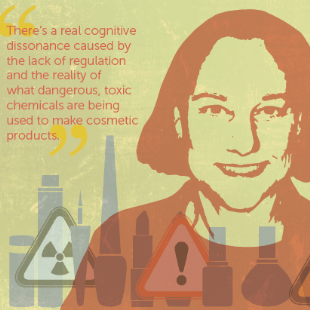More than 12,500 different chemicals are used to make our everyday personal hygiene products—from toothpaste and shampoo to lotion and lipstick. Unfortunately, these are among the least-regulated items you can buy. Janet Nudelman, director of program and policy for the Breast Cancer Fund and cofounder of its Campaign for Safe Cosmetics project, takes us behind the scenes.
OPTIMUM WELLNESS: Why did you create the Campaign for Safe Cosmetics in 2004?
JANET NUDELMAN: In 2003, the European Union adopted very strong cosmetic safety laws banning 1,328 chemicals of concern from personal care products. The U.S. only bans 11. When the Centers for Disease Control and Prevention found high levels of phthalates (chemicals found in plastic) in women of childbearing age, we learned that phthalates were present in perfumes. We wondered what else was lurking in cosmetic products—and we discovered a wide range of chemicals of concern.
Why aren’t personal care products more tightly regulated?
That’s the million-dollar question. The product-safety law that governs the $71 billion cosmetics industry hasn’t been significantly updated in more than 75 years, and very little federal cosmetic safety regulation exists. There’s a real cognitive dissonance caused by the lack of regulation and the reality of what dangerous, toxic chemicals are being used to make cosmetic products.
What chemicals should we be worried about?
Our website, safecosmetics.org, has information about individual chemicals of concern. A few that I really care about are formaldehyde and parabens—two chemical preservatives linked to cancer—and phthalates and fragrance. Phthalates have been banned by the European Union, and dozens to hundreds of chemicals can hide under the term ‘fragrance’ on a label. Cumulative chemical exposures can add up to harm.
What has the Campaign for Safe Cosmetics accomplished?
Ten years ago when we started out, no one was talking about this issue. Today, there’s a growing public awareness and demand for safer products—that’s success. One of our biggest accomplishments was convincing Johnson & Johnson to globally reformulate all of its baby and adult products to address a suite of chemicals of concern. Last year, we convinced Procter & Gamble, the world’s largest manufacturer of consumer products, to remove triclosan (an antimicrobial agent) and diethyl phthalate from their products. Avon and a few other big companies have vowed to stop using triclosan as well. We also helped convince two big retailers to adopt sustainability policies that address the safety of personal care products. And many smaller companies have been doing a lot to raise the bar and prove that safe cosmetic production is not only possible, it’s profitable. The next step that needs to happen is regulatory reform.
Is anything being done to change regulation laws?
We’re supporting the Safe Cosmetics and Personal Care Products Act introduced by Reps. Jan Schakowsky [D-Ill.] and Ed Markey [D-Mass]. This is very important legislation that would give the Food and Drug Administration the statutory authority and the resources it needs to more strictly regulate the cosmetics industry. I’m optimistic.
What are your tips for shoppers?
Download the free Think Dirty app, which rates the safety of many personal care products. Consumers shouldn’t have to be organic chemists in order to understand the safety of the products they use. They should be able to feel confident about every item on the shelf. But the only way we’ll get to that point is if there’s strong federal oversight of the cosmetics industry. That’s why we encourage people to get engaged on a political level, too. Because at the end of the day, we can’t just shop our way out of this problem.

